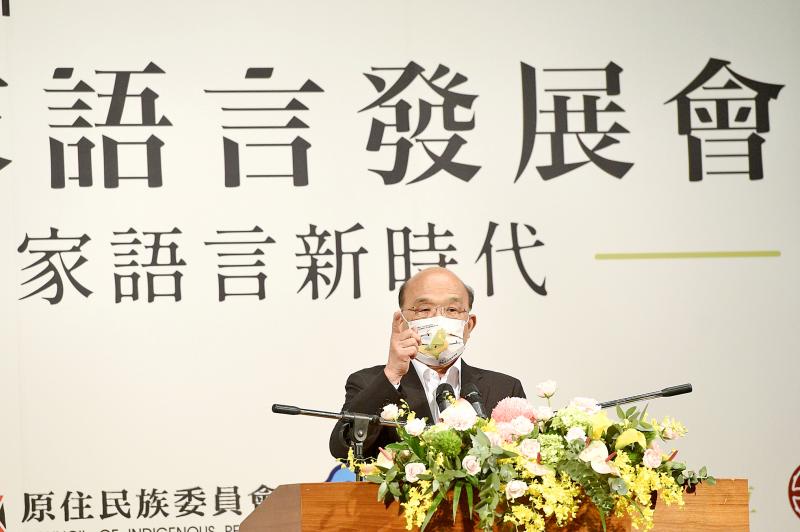Premier Su Tseng-chang (蘇貞昌) yesterday presented an outline to promote Taiwan’s native languages, as well as English, including a five-year budget of NT$30 billion (US$1.01 billion).
The new language policy has the dual purpose of recognizing Taiwan’s official languages and improving the English-language abilities of Taiwanese, Su told the weekly Cabinet meeting in Taipei.
“We are not pushing a bilingual policy [of Mandarin and English], nor will English be one of the nation’s official languages,” he said.

Photo: George Tsorng, Taipei Times
Groups last month said that English was being elevated at the expense of Taiwan’s diverse languages, which are in severe decline.
“During authoritarian rule under the one-party state dictatorship, Taiwan’s native languages were suppressed, but they survived,” Su said.
“However, even with the suppression removed, the native languages are facing rapid erosion while the cultures they come from are gradually dying out.”
“We are at a critical time for the endangered native languages of Taiwan,” he said.
“The government is determined to pool resources to revitalize and sustain our nation’s native languages for future generations,” he said.
The plan is to focus on programs to record the words of elders and native speakers, compile a database of Taiwan’s languages and regional vernacular, organize speech contests and cultural activities, and sponsor training for teachers and parents to promote the use of such languages at home, Su said.
“We will endeavor to preserve and revitalize Taiwan’s native languages,” Su said.
Students will have English-language classes each week, the Ministry of Culture said.
However, the government would not mandate that schools teach mathematics, history and other core courses in English, the ministry said.
The ministry has said Taiwan Sign Language, as well as Hokkien, Hakka, the indigenous languages, and Mindong dialect on Matsu are at risk of disappearing.
In a statement issued after the Cabinet meeting, the ministry said that a coordinated effort by government agencies, rather than the government’s previous piecemeal approach, is needed to preserve Taiwan’s languages.
Additional reporting by CNA

AIR SUPPORT: The Ministry of National Defense thanked the US for the delivery, adding that it was an indicator of the White House’s commitment to the Taiwan Relations Act Deputy Minister of National Defense Po Horng-huei (柏鴻輝) and Representative to the US Alexander Yui on Friday attended a delivery ceremony for the first of Taiwan’s long-awaited 66 F-16C/D Block 70 jets at a Lockheed Martin Corp factory in Greenville, South Carolina. “We are so proud to be the global home of the F-16 and to support Taiwan’s air defense capabilities,” US Representative William Timmons wrote on X, alongside a photograph of Taiwanese and US officials at the event. The F-16C/D Block 70 jets Taiwan ordered have the same capabilities as aircraft that had been upgraded to F-16Vs. The batch of Lockheed Martin

US President Donald Trump yesterday announced sweeping "reciprocal tariffs" on US trading partners, including a 32 percent tax on goods from Taiwan that is set to take effect on Wednesday. At a Rose Garden event, Trump declared a 10 percent baseline tax on imports from all countries, with the White House saying it would take effect on Saturday. Countries with larger trade surpluses with the US would face higher duties beginning on Wednesday, including Taiwan (32 percent), China (34 percent), Japan (24 percent), South Korea (25 percent), Vietnam (46 percent) and Thailand (36 percent). Canada and Mexico, the two largest US trading

GRIDLOCK: The National Fire Agency’s Special Search and Rescue team is on standby to travel to the countries to help out with the rescue effort A powerful earthquake rocked Myanmar and neighboring Thailand yesterday, killing at least three people in Bangkok and burying dozens when a high-rise building under construction collapsed. Footage shared on social media from Myanmar’s second-largest city showed widespread destruction, raising fears that many were trapped under the rubble or killed. The magnitude 7.7 earthquake, with an epicenter near Mandalay in Myanmar, struck at midday and was followed by a strong magnitude 6.4 aftershock. The extent of death, injury and destruction — especially in Myanmar, which is embroiled in a civil war and where information is tightly controlled at the best of times —

China's military today said it began joint army, navy and rocket force exercises around Taiwan to "serve as a stern warning and powerful deterrent against Taiwanese independence," calling President William Lai (賴清德) a "parasite." The exercises come after Lai called Beijing a "foreign hostile force" last month. More than 10 Chinese military ships approached close to Taiwan's 24 nautical mile (44.4km) contiguous zone this morning and Taiwan sent its own warships to respond, two senior Taiwanese officials said. Taiwan has not yet detected any live fire by the Chinese military so far, one of the officials said. The drills took place after US Secretary